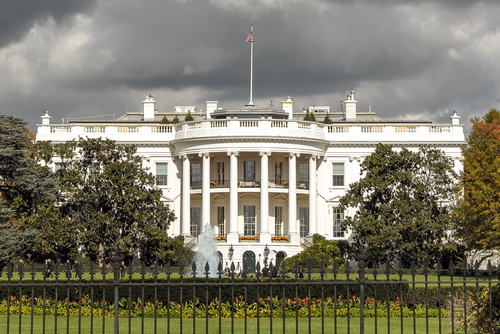White House counsel cites due process concerns in refusing cooperation in impeachment inquiry

Image from Shutterstock.com.
White House counsel Pat Cipollone argued that the impeachment inquiry into President Donald Trump violates due process and separation of powers in his Oct. 8 letter asserting that the White House won’t cooperate.
“To fulfill his duties to the American people, the Constitution, the executive branch and all future occupants of the office of the presidency, President Trump and his administration cannot participate in your partisan and unconstitutional inquiry under these circumstances,” Cipollone wrote in the letter.
The Washington Post, the New York Times, the Atlantic and Politico have coverage.
Democrats in the House of Representatives have said the refusal to cooperate is itself an impeachable act of corruption. According to the New York Times, the letter is “setting the stage for a constitutional clash with far-reaching consequences.”
Cipollone’s letter said Democratic leaders had denied Trump the right to cross-examine and call witnesses, to receive transcripts of testimony, to access evidence and to have counsel present. He also said Republican members were not given power to subpoena their own witnesses.
The letter also argued that separation of powers is being violated by threats “to punish those who exercise fundamental constitutional rights and prerogatives.”
Never before has the House launched an impeachment inquiry against a president without first approving it by a majority vote, the letter said. Initiating an inquiry by press conference does not provide the authorization for a valid impeachment proceeding, the letter claimed.
The letter argued that Democratic leaders seek to “overturn the results of the 2016 election and deprive the American people of the president they have freely chosen.”
It’s not clear whether Speaker of the House Nancy Pelosi is required to follow congressional precedent in handling an impeachment inquiry, according to the New York Times. The Constitution provides that the House “shall have the sole power of impeachment” but doesn’t set out procedural rules.
Stephen Vladeck, a law professor at the University of Texas, told the Associated Press that he thinks the constitutional arguments were made with a different purpose in mind. “I think the goal of this letter is to further inflame the president’s supporters and attempt to delegitimize the process in the eyes of his supporters,” he said.
When the U.S. Supreme Court last considered an impeachment issue, in 1993, it held that impeachment rules were to be decided by Congress, rather than the courts. The court ruled in the case of U.S. District Judge Walter Nixon of Mississippi, who was convicted of perjury and removed through impeachment. Nixon had challenged the use of a Senate committee, rather than the full Senate, to receive evidence and take testimony.
In the current inquiry, the House is investigating whether Trump abused his office by asking the leader of Ukraine to “do us a favor” by investigating former Vice President Joe Biden and his son, who was on the board of a gas company in Ukraine. Cipollone contended that a transcript of Trump’s July 25 phone discussion with Ukrainian President Volodymyr Zelensky shows that the call “was completely appropriate.” Trump has himself asserted that there was no quid pro quo.
A federal judge is already considering one legal issue raised in the impeachment inquiry—whether the House can get redacted grand jury materials from the report by former special counsel Robert Mueller, report CNBC and Law.com here and here.
In a hearing Tuesday before Chief U.S. District Judge Beryl Howell of the District of Columbia, House general counsel Douglas Letter argued that it wasn’t necessary for the House to formally vote to begin an impeachment inquiry. “We are in an impeachment inquiry, an impeachment investigation, a formal impeachment investigation, because the House says it is,” Letter said.
Arguing for the White House, lawyer Elizabeth Shapiro, a deputy director in Department of Justice’s civil division, argued that a judge’s decision to give grand jury materials to the House in the Watergate investigation would have been wrong under today’s interpretation of the rules by the DOJ.
“Wow. OK,” Howell replied.
Related articles:
ABAJournal.com: “Questions raised about attorney general and DOJ legal opinion as whistleblower complaint is released”
ABAJournal.com: “Trump urged Ukrainian president to speak with Barr about investigating Biden, transcript shows”



